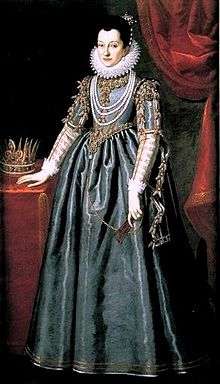Christina of Lorraine
| Christina of Lorraine | |
|---|---|
 | |
| Grand Duchess consort of Tuscany | |
| Reign | 3 May 1589 – 17 February 1609 |
| Born |
16 August 1565 Ducal Palace of Nancy, Lorraine |
| Died |
19 December 1637 (aged 72) Palazzo Pitti, Florence, Tuscany |
| Burial | Basilica of San Lorenzo, Florence |
| Spouse | Ferdinando I, Grand Duke of Tuscany |
| Issue |
Cosimo II, Grand Duke of Tuscany Maria Maddalena de' Medici Catherine, Governor of Siena Carlo de' Medici Claudia, Archduchess of Austria |
| House |
House of Lorraine (by birth) House of Medici (by marriage) |
| Father | Charles III, Duke of Lorraine |
| Mother | Claude of Valois |
Christina of Lorraine or Christine de Lorraine (16 August 1565 – 19 December 1637) was a member of the House of Lorraine and was the Grand Duchess of Tuscany by marriage. She served as Regent of Tuscany jointly with her daughter-in-law during the minority of her grandson from 1621.
Princess of Lorraine
Born Christine de Lorraine in Nancy, she was the daughter of Charles III of Lorraine and his wife Claude of Valois, and granddaughter of Catherine de' Medici. She was named after her paternal grandmother, Christina of Denmark.
Marriage
In 1587 Francesco I de' Medici, Grand Duke of Tuscany died without a legitimate male heir; his brother Ferdinando immediately declared himself the third Grand Duke of Tuscany. Seeking a marriage that would preserve his political independence, Ferdinando chose his distant cousin, Christine of Lorraine, the favorite granddaughter of Catherine de' Medici, Queen of France. Catherine had influenced her towards this marriage, to re-align the Medici with France, not Spain.
The sumptuous and well-documented wedding festivities, celebrated in Florence in 1589, were designed to impress the royal houses of Europe. The wedding ceremony in Florence Cathedral was followed by outdoor events for the public, as well as banquets and balls, comedies and musical interludes, and a mock sea battle in the flooded courtyard of Palazzo Pitti for the aristocratic guests. Altogether the wedding spectacles cost approximately fourteen million pounds in today’s currency. These lavish and innovative forms of entertainment proved to be more than showmanship. They greatly influenced theatrical practices in European courts throughout the 17th century.
Galileo wrote his Letter to Grand Duchess Christina, expounding on the relationship between science and revelation, in 1615.
Regent of Tuscany
Her son Cosimo II died in 1621, leaving his ten-year-old son Ferdinando as grand duke. Christina and her daughter-in-law, Maria Maddalena of Austria, acted as regents until the boy came of age. Their collective regency is known as the Tutrici. Christina's temperament was analogous to Maria Maddalena's. Together, they aligned Tuscany with the Papacy and re-doubled the Tuscan clergy.[1] Upon the death of the last Duke of Urbino, instead of claiming the duchy for Ferdinando, who was married his granddaughter, and heiress, Vittoria della Rovere, they permitted it to be annexed by Pope Urban VIII.
In 1626, they banned any Tuscan subject from being educated outside the Grand Duchy, a law later resurrected by Christina's great grandson, Cosimo III.[2] Harold Acton ascribes the decline of Tuscany to their regency.[2] The Dowager Grand Duchesses sent Ferdinando on a tour of Europe in 1627.[3] Maria Maddalena died in 1631, one year before her son took over the reins of government. Christina of Lorraine died in Florence at the age of 72.
Issue
- Cosimo II de' Medici, Grand Duke of Tuscany (1590–1621) married Maria Maddalena of Austria and had issue.
- Eleonora de' Medici (1591–1617) died unmarried.
- Caterina de' Medici (1593–1629) married Ferdinando Gonzaga, Duke of Mantua, later Governor of Siena;
- Francesco de' Medici (1594–1614) died unmarried.
- Carlo de' Medici (1595–1666) died unmarried.
- Filippino de' Medici (1598–1602) died unmarried.
- Lorenzo de' Medici (1599–1648) died unmarried.
- Maria Maddalena de' Medici (1600–1633) died unmarried.
- Claudia de' Medici (1604–1648) married (1) Federico della Rovere and had issue (2) Leopold V, Archduke of Austria and had issue.
Ancestry
| Ancestors of Christina of Lorraine | ||||||||||||||||||||||||||||||||||||||||||||||||||||||||||||||||||||||||||||||||||||||||||||||||||||||||||||||||||||||||||||||||||||||||||||||||||||||||||||||||||||||||||||||||||||||||||||||||||||||||||||||||||||||||||||||||||||||||||||||||||||||||||||||||||||||||||||||||||||||||||||||||||||||||||||||||||||||||||||||||||||||||||||||||||||||||||||||||||||||||||||||||||||||||||||||||||||||||||||||||||||||||||||||||||||||||||||||||||||||||||||||||||||||||||||||||||||||||||||||||||||||||||||||||||||||||||||||||||
|---|---|---|---|---|---|---|---|---|---|---|---|---|---|---|---|---|---|---|---|---|---|---|---|---|---|---|---|---|---|---|---|---|---|---|---|---|---|---|---|---|---|---|---|---|---|---|---|---|---|---|---|---|---|---|---|---|---|---|---|---|---|---|---|---|---|---|---|---|---|---|---|---|---|---|---|---|---|---|---|---|---|---|---|---|---|---|---|---|---|---|---|---|---|---|---|---|---|---|---|---|---|---|---|---|---|---|---|---|---|---|---|---|---|---|---|---|---|---|---|---|---|---|---|---|---|---|---|---|---|---|---|---|---|---|---|---|---|---|---|---|---|---|---|---|---|---|---|---|---|---|---|---|---|---|---|---|---|---|---|---|---|---|---|---|---|---|---|---|---|---|---|---|---|---|---|---|---|---|---|---|---|---|---|---|---|---|---|---|---|---|---|---|---|---|---|---|---|---|---|---|---|---|---|---|---|---|---|---|---|---|---|---|---|---|---|---|---|---|---|---|---|---|---|---|---|---|---|---|---|---|---|---|---|---|---|---|---|---|---|---|---|---|---|---|---|---|---|---|---|---|---|---|---|---|---|---|---|---|---|---|---|---|---|---|---|---|---|---|---|---|---|---|---|---|---|---|---|---|---|---|---|---|---|---|---|---|---|---|---|---|---|---|---|---|---|---|---|---|---|---|---|---|---|---|---|---|---|---|---|---|---|---|---|---|---|---|---|---|---|---|---|---|---|---|---|---|---|---|---|---|---|---|---|---|---|---|---|---|---|---|---|---|---|---|---|---|---|---|---|---|---|---|---|---|---|---|---|---|---|---|---|---|---|---|---|---|---|---|---|---|---|---|---|---|---|---|---|---|---|---|---|---|---|---|---|---|---|---|---|---|---|---|---|---|---|---|---|---|---|---|---|---|---|---|---|---|---|---|---|---|---|---|---|---|---|---|---|---|---|---|---|---|---|---|---|---|---|---|---|---|---|---|---|---|---|---|---|---|---|---|---|---|---|---|---|---|---|---|---|---|---|---|---|---|---|---|---|---|---|---|---|---|---|---|---|---|---|---|---|---|---|---|---|---|---|---|---|---|---|---|---|---|---|---|---|---|---|---|---|---|---|---|---|---|---|---|---|---|---|---|---|---|---|---|---|---|---|---|---|---|---|---|---|---|
| ||||||||||||||||||||||||||||||||||||||||||||||||||||||||||||||||||||||||||||||||||||||||||||||||||||||||||||||||||||||||||||||||||||||||||||||||||||||||||||||||||||||||||||||||||||||||||||||||||||||||||||||||||||||||||||||||||||||||||||||||||||||||||||||||||||||||||||||||||||||||||||||||||||||||||||||||||||||||||||||||||||||||||||||||||||||||||||||||||||||||||||||||||||||||||||||||||||||||||||||||||||||||||||||||||||||||||||||||||||||||||||||||||||||||||||||||||||||||||||||||||||||||||||||||||||||||||||||||||
Titles, styles, honours and arms
Titles and Styles
- 16 August 1565 – 3 May 1589 Her Highness Christine of Lorraine
- 3 May 1589 – 17 February 1609 Her Highness The Grand Duchess of Tuscany
- 17 February 1609 – 9 December 1637 Her Highness The Dowager Grand Duchess of Tuscany
Notes
External links
![]() Media related to Christina of Lorraine at Wikimedia Commons
Media related to Christina of Lorraine at Wikimedia Commons
See also
| Christina of Lorraine Born: 16 August 1565 Died: 19 December 1637 | ||
| Italian royalty | ||
|---|---|---|
| Vacant Title last held by Bianca Cappello |
Grand Duchess consort of Tuscany 1589-1609 |
Succeeded by Maria Maddalena of Austria |
| ||||||||||||||||||||||||||||||||||||||||||||||||||
| ||||||
|
